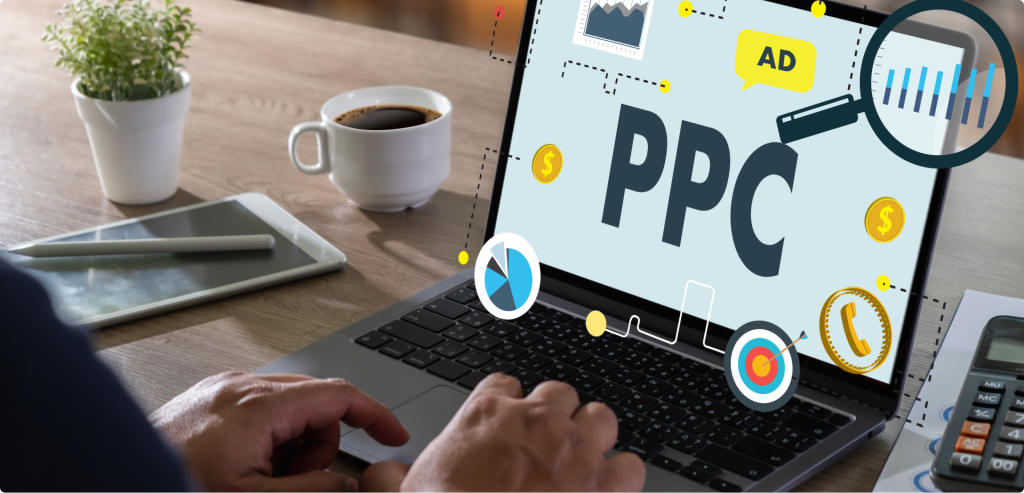Maximizing ROI with PPC: A Small Business Guide to Successful Paid Advertising

- Home
- -
- Uncategorized
- -
- Maximizing ROI with Pay-Per-Click...
Published on
Introduction
Pay-Per-Click (PPC) advertising is a powerful digital marketing strategy that enables businesses to gain immediate visibility on search engines and other platforms. By paying for ads that appear when users search for specific keywords, small businesses can drive targeted traffic to their websites and achieve high returns on investment (ROI). PPC advertising offers numerous benefits, including precise targeting, measurable results, and cost control.
In this comprehensive guide, we will explore the essentials of PPC advertising, from setting up your first campaign to optimizing your performance. We'll cover the basics of PPC platforms, keyword research, crafting effective ad copy, optimizing landing pages, and measuring success. By following these strategies, small businesses can maximize their ROI and achieve successful paid advertising campaigns.
Getting Started with PPC
Introduction to Google Ads and Other Platforms
Google Ads is the most popular PPC platform, allowing businesses to display ads on Google search results and partner websites. Other notable PPC platforms include:
- Bing Ads: Similar to Google Ads but targets Bing's search engine users.
- Facebook Ads: Allows you to place ads on Facebook and Instagram, using detailed demographic and interest targeting.
- LinkedIn Ads: Targets professionals and businesses on LinkedIn, ideal for B2B marketing.

How to Set Up Your First PPC Campaign
- Create an Account: Sign up for a Google Ads account or any other PPC platform you choose.
- Set Campaign Goals: Define what you want to achieve, such as increased website traffic, lead generation, or sales.
- Select Campaign Type: Choose from various options like Search Network, Display Network, Shopping, or Video campaigns.
- Target Your Audience: Use demographic, geographic, and interest-based targeting to reach your ideal customers.
- Choose Keywords: Select relevant keywords that potential customers might use to find your products or services.
- Create Ad Copy: Write compelling headlines and descriptions for your ads.
- Set Budget and Bids: Determine your daily budget and decide how much you’re willing to pay per click.
Importance of Setting a Budget and Bidding Strategy
Setting a budget ensures you don’t overspend on your PPC campaigns. Your bidding strategy determines how much you’re willing to pay for each click, affecting your ad's placement and visibility. Common bidding strategies include:
- Manual CPC: You set individual bids for keywords.
- Enhanced CPC: Google adjusts your manual bids to maximize conversions.
- Target CPA: Google's algorithm aims to achieve a specific cost per acquisition.
Keyword Research for PPC
Choosing the Right Keywords for Your Ads
Selecting the right keywords is crucial for the success of your PPC campaign. Focus on:
- Relevance: Ensure your keywords are closely related to your products or services.
- Search Volume: Target keywords with sufficient search volume to drive traffic.
- Competition: Consider the competitiveness of keywords and choose a mix of high-competition and long-tail keywords.
Tools for PPC Keyword Research
Several tools can help you identify the best keywords for your PPC campaigns:
- Google Keyword Planner: Provides keyword ideas, search volumes, and competition levels.
- Ubersuggest: Offers keyword suggestions, search volumes, and SEO difficulty scores.
- SEMrush: Provides comprehensive keyword analysis, including competitive research and keyword trends.
Negative Keywords and Why They Matter
Negative keywords prevent your ads from showing up for irrelevant searches, saving your budget for more qualified clicks. For example, if you sell luxury watches, you might add "cheap" as a negative keyword to avoid attracting bargain hunters. Regularly review and update your negative keyword list to optimize your campaign.
Crafting Effective Ad Copy
Writing Compelling Headlines and Descriptions
Your ad copy should capture attention and compel users to click. Tips for writing effective ad copy include:
- Highlight Benefits: Clearly state the benefits of your product or service.
- Include Keywords: Incorporate relevant keywords to improve ad relevance and quality score.
- Create Urgency: Use time-sensitive language to encourage immediate action (e.g., "Limited Time Offer").
- Use Strong CTAs: Prompt users to take action with phrases like "Buy Now," "Sign Up Today," or "Get Started."

Using Ad Extensions to Enhance Visibility
Ad extensions provide additional information and increase the visibility of your ads. Types of ad extensions include:
- Sitelink Extensions: Links to specific pages on your website.
- Call Extensions: Add a phone number to your ad.
- Location Extensions: Show your business address and link to Google Maps.
- Review Extensions: Display positive reviews from third-party sources.
Importance of Aligning Ad Copy with Landing Pages
Ensure your ad copy aligns with the content of your landing page to provide a seamless user experience. Consistency in messaging increases trust and improves conversion rates. Your landing page should deliver on the promise made in your ad, whether it’s a special offer, product information, or a sign-up form.
Optimizing Landing Pages
Creating High-Converting Landing Pages
A well-optimized landing page is essential for converting clicks into customers. Best practices include:
- Clear Headline: Communicate the main benefit or offer immediately.
- Engaging Visuals: Use high-quality images or videos to support your message.
- Concise Content: Provide relevant information without overwhelming the visitor.
- Strong CTA: Place a prominent call-to-action above the fold.
- Trust Signals: Include testimonials, reviews, and security badges to build credibility.
Best Practices for Design and Content
Effective landing page design and content contribute to higher conversion rates:
- Mobile Optimization: Ensure your landing page is responsive and looks good on all devices.
- Fast Load Times: Optimize images and minimize code to reduce load times.
- A/B Testing: Test different headlines, images, and CTAs to identify the most effective combinations.
Importance of A/B Testing for Landing Pages
A/B testing involves comparing two versions of a landing page to see which performs better. Test one element at a time (e.g., headline, CTA color) to accurately determine its impact on conversions. Use tools like Google Optimize or Unbounce for A/B testing.
Measuring and Improving PPC Performance
Key Metrics to Track
Monitoring key metrics helps you understand the effectiveness of your PPC campaigns:
- Cost Per Click (CPC): The average amount you pay for each click.
- Click-Through Rate (CTR): The percentage of impressions that result in clicks.
- Conversion Rate: The percentage of clicks that result in a desired action (e.g., purchase, sign-up).
- Return on Ad Spend (ROAS): The revenue generated for every dollar spent on advertising.
Tools for PPC Analysis
Several tools can help you analyze and optimize your PPC performance:
- Google Analytics: Provides insights into traffic sources, user behavior, and conversions.
- SEMrush: Offers in-depth PPC analysis, including competitor insights and keyword performance.
- Google Ads Reports: Detailed reports on ad performance, keyword metrics, and audience data.
Strategies for Continuous Optimization
Continuous optimization is key to maximizing your PPC ROI. Strategies include:
- Regularly Review Performance: Analyze campaign data to identify areas for improvement.
- Adjust Bids and Budgets: Allocate more budget to high-performing keywords and ads.
- Refine Keyword Lists: Update your keyword list based on performance and search trends.
- Improve Ad Relevance: Continuously test and refine ad copy to enhance relevance and quality score.
- Optimize Landing Pages: Use A/B testing and user feedback to improve landing page effectiveness.
Conclusion
Maximizing ROI with PPC advertising requires a strategic approach, from setting up your initial campaign to ongoing optimization. By selecting the right keywords, crafting compelling ad copy, optimizing landing pages, and monitoring key metrics, small businesses can achieve significant results with their PPC efforts.
Start implementing these strategies today to see improvements in your paid advertising performance. For personalized assistance and expert advice, contact us for a free PPC consultation and take your campaigns to the next level.


